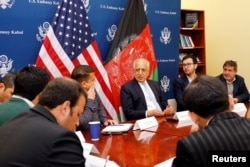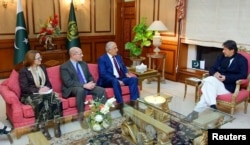An upcoming meeting in Pakistan between a delegation of the United States and Taliban representatives has been cancelled, according to information coming from both sides.
A Taliban leader confirmed, on condition of anonymity, that the meeting was cancelled, “by the Americans.” A Taliban statement issued later in the day said the talks were postponed because many members of its 14 person negotiating team were unable to go overseas since they are on "the US and UN blacklist." Several of them are on the U.N. Security Council sanctions list which bars them from international travel.
Meanwhile, a U.S. official said Zalmay Khalilzad, who was supposed to lead the American delegation, is not planning to visit Islamabad this week.
The U.S. said it had not received an official invitation from the government of Pakistan for this meeting which was first announced by Taliban spokesman Zabiullah Mujahid a couple of days ago.
Mujahid's statement had set February 18 as the date of the talks and said a formal invitation had been issued by Pakistan. In addition, he said, the Taliban delegation would also meet the Pakistani Prime Minister Imran Khan.
A day later, Pakistan’s information minister Fawad Chaudhry confirmed the talks during a press conference, calling it a “game changer.”
“The next round of negotiations with the Taliban will be in Pakistan, and as a result of these negotiations, there is a chance of stability in Afghanistan,” he said.
Afghanistan’s Foreign Ministry reacted strongly to the announcement of a meeting in Islamabad, saying it was in violation of a United Nations Security Council resolution.
“#Afghanistan complains to #UNSecurityCouncil on #Pakistan’s engagements with the Taliban on which #Afg Govenrment is not consulted,” Tweeted Sibghatullah Admadi, a spokesman for the Afghan foreign office.
Previously, Afghanistan launched a similar complaint against Russia for allowing Taliban members to travel to Moscow for a conference in which nearly 50 Afghans, including various political leaders, former jihadi commanders, and civil society activists were invited. However, the Afghan government was not invited to that conference because the Taliban have so far refused to engage with the Kabul administration despite pressure from the U.S., Saudi Arabia, and others.
President Ashraf Ghani lashed out at those attending the conference saying they had no “executive authority” to make any agreements.
“Let hundreds of such meetings be held,” he said.
Some analysts say Ghani’s statements indicated his frustration at being left out of the negotiations between the Americans and the Taliban that first started last Summer. Since then, the two sides have held several rounds of talks.
The last meeting in Doha early January lasted for six days and Khalilzad said the two sides had agreed “in principle” to a withdrawal of foreign troops from Afghanistan in return for guarantees that Afghan soil will not be used by any terrorist groups or individuals.
Speaking in a public event at Washington based United States Institute of Peace, Khalilzad said the Taliban do not want to “sit with the government alone” because they did not want to give President Ghani an advantage in the presidential elections scheduled in July.
“There are indications that they will be willing to sit with the government in a multi-party arrangement,” he said.







